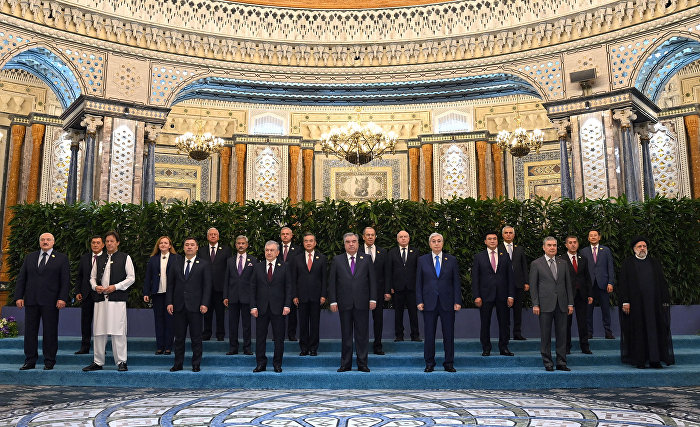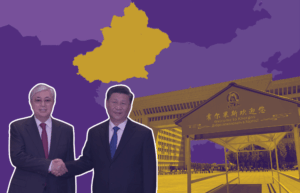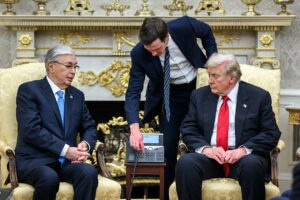Held on 17 September in Dushanbe, the annual summit of the Shanghai Cooperation Organisation (SCO) clarified member countries’ positions on Afghanistan. Bringing together China, Russia, and four of five Central Asian countries, the SCO meeting seems to have been a particularly popular occasion for making statements about neighbouring Afghanistan. This article was originally published on Novastan’s French website on 20 September 2021.In Dushanbe, Afghanistan’s neighbouring countries were able to establish what had been unclear since the Taliban’s seizure of power. On 17 September, the Shanghai Cooperation Organisation (SCO), founded in Beijing in 2001, organised its annual meeting in the capital of Tajikistan. At the table were the majority of the institution’s members: Tajikistan, Uzbekistan, Kyrgyzstan, Kazakhstan, and Pakistan. Joining the meeting remotely were China, Russia, and India.Aside from statements vaunting cooperation among the eight member countries, the Dushanbe Summit made possible an in-depth discussion about Afghanistan. Three of the organisation’s countries sharpened their differences concerning Afghanistan, at the same time presenting a superficial impression of being in accord.
The Push for an Inclusive Government
These three members expressed their desire to see an inclusive government in Afghanistan, according to Tajik media outletAsia-Plus. On 21 September, only a few days after that statement was made, the Taliban announced the new members of their government: only one Uzbek and two Tajiks. These new members are essentially in lower-level positions, or are ethnic Hazaras, as reported by Afghan media Tolonews and the American news agency AP.
The humanitarian situation of refugees was also raised, with SCO members expressing a desire for their long-term accommodation, and for the facilitating of a “dignified, safe, and permanent return to their country,” the communal statement declared.
Uzbekistan: the Most Pro-Taliban Country
But that statement did not erase the differences among the heads of state. True to his role as mediator, Uzbek president Shavkat Mirziyoyev suggested that business discussions with Afghanistan were more relevant than ever, according to Russian press agency TASS. The leader of the most populous Central Asian country hoped that high-level meetings between the SCO and Afghanistan would be held regularly, which would amount to official recognition of the Taliban government. Shavkat Mirziyoyev also asserted that Afghan assets in foreign banks should be unfrozen.Unfreezing these assets was also supported by Vladimir Putin via video-conference, reported TASS. The Russian president expressed his desire for international aid to be set up, with most of the cost carried by the United States, who he judged as responsible for the Taliban’s seizure of power. In addition, the Kyrgyz and Kazakh presidents affirmed that a security barrier should be set up around Afghanistan to combat drugs trafficking and terrorism, according to Kazakh media site Tengrinews.Sadyr Japarov and Kassym-Jomart Tokaev have also suggested that humanitarian aid be provided to Afghanistan, and said they are prepared to participate but without providing specific details, Russian media site Sputnik reported.
Tajikistan: Leader of the Anti-Taliban
These fairly amicable positions towards the Taliban were largely eclipsed by bombastic statements by the Tajiki president. According to Emomali Rahmon, the Taliban movement intends to establish autocracy in Afghanistan by installing an “Islamic emirate based on harsh medieval Sharia law,”asreported by Radio Ozodi, the Tajik branch of the American media Radio Free Europe. In line with earlier statements, Tajikistan’s head of state asserted that the Taliban must allow humanitarian aid to be delivered toPanjshir, a province fighting Afghanistan’s new rulers which has been cut off from the world since late July, reported Radio Ozodi. However, the Tajik president’s assertions were most virulent on the eve of the SCO summit, with Dushanbe hosting a meeting of the Collective Security Treaty Organization (CSTO), a militaristic organisation directed by Moscow. “The composition of the interim government announced by the Taliban fails to take into consideration political, ethnic, and linguistic diversity, and equality of the sexes. This means that over the course of the next two or three years the propagation of extreme ideology in Afghanistan will increase, and the likelihood that these destructive ideas will spread into adjacent areas will be multiplied,”stated Emomali Rahmon, as reported by Radio Ozodi.Despite expected tensions in the SCO due to the presence of Pakistan, a strong supporter of the Taliban, no conflict arose when the Tajik head of state met with the Pakistani prime minister Imran Khan away from the main stage of the summit, Asia-Plusreported. The two heads of state expressed their shared readiness to facilitate talks between the Taliban and the Tajiks of Afghanistan, and signedeight agreements.
Afghanistan, a Double-edged Sword for the SCO
More broadly, disagreements among members seem damaging to the idea that the SCO, under the leadership of China and Russia, can take the upper hand in Afghanistan. “The SCO is a very great organisation with numerous unsolved problems among its members, which makes it imperfect,”Konstantin Kourylev, a professor of international relations at Moscow’s Peoples’ Friendship University, told Novastan. In fact, the 2017 admission of Pakistan and India increased dissent, whereas the SCO officially admitted Iran as a separate full member during the Dushanbe Summit, Asia-Plus reported. “So the SCO ought not to be considered a force capable of influencing the situation in Afghanistan. The [member] states alone can be influential, but they are poorly organised and therefore ineffective,” suggested the Russian researcher.That position is not shared by the director of the Institute for European Perspective and Security, Emmanuel Dupuy. “Afghanistan will be a unifying subject for the SCO, since nearly all of its neighbouring countries are members, except for Turkmenistan. The formal admission of Iran as the ninth member confirms this,” he believes in an interview with Novastan. “Furthermore, the flagship countries of the SCO, like Russia and China, are in the process of taking advantage of the American absence in Central and South Asia. Witness the deployment of Russian troops to Tajikistan, the Rubezh-2021 military exercises in Kyrgyzstan, and the planning of the first communal naval manoeuvres by Iran, China, and Russia,” he added.Expanding on this theme, Emmanuel Dupuy suggests that “the strengthening of the SCO is only the first stage of a rocket that will see the strengthening of the CSTO, and no doubt the removal of obstacles to membership for Central Asian countries that up until now have hesitated to join—for instance, Uzbekistan. All this will occur in a context in which Russia will seem to be the lesser evil to Central Asian countries after the American retreat.”Taking a middle path, Ding Xiaoxing, director of the Institute of Eurasian Studies, published an opinion on theSCO site apparently shared by that organisation. “The SCO is an ideal platform for resolving the Afghanistan problem. The organisation can play a part in coordinating members’ differing positions on Afghanistan and their shared encouragement of the goals of internal peace and stability in that country,”he suggested. It remains to be seen how the Taliban will react to the attempts of the SCO to play humanitarian, protective, and diplomatic roles simultaneously, while at the same time being noticeably divided on how to accomplish these goals.
Etienne Combier Editor-in-chief of Novastan
Translated from French by Judy Harter
Edited by Fiona Katherine Smith
For more news and analysis from Central Asia, follow us on Twitter, Facebook, Telegram, Linkedin or Instagram.
 Hardening Positions on Afghanistan following Summit in Dushanbe
Hardening Positions on Afghanistan following Summit in Dushanbe 



